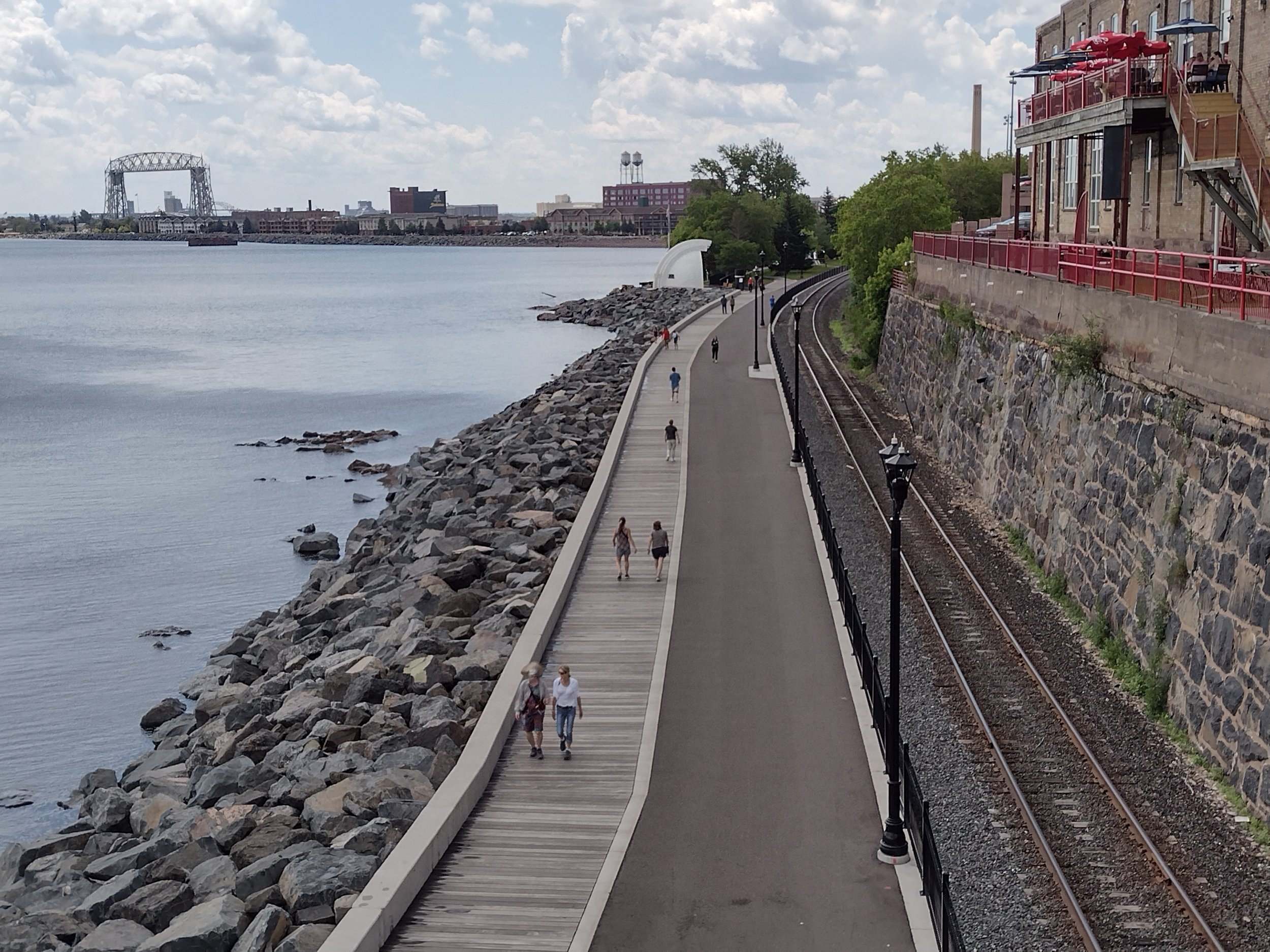Protecting the Lake Superior Coastline from Severe Storm Events
DULUTH, MINNESOTA
Improvements to the downtown Lakewalk in Duluth, Minnesota, are increasing climate resiliency, public safety, and accessibility, along the Lake Superior coastline.
In 2017 and 2018, three major storms along the banks of Lake Superior caused more than $30 million in damage to the waterfront Lakewalk in Duluth, Minnesota.
The Lakewalk—which offers access to downtown tourist districts, beaches, historic sites, and views of the lake—was built in 1986 and expanded over the course of the last 38 years to encompass nearly eight miles of paved, multi-modal pathways for bikers, skateboarders, pedestrians, and anyone else interested in exploring the natural beauty of the coast.
The trail has become a popular destination for activities like birdwatching, hiking, picnicking, concertgoing, and shopping for both locals and the city’s more than 6 million annual tourists. However, as climate change has resulted in more frequent severe storm events, the Lakewalk’s proximity to Lake Superior has paved the way for continued infrastructure challenges.
Duluth Lakewalk.
Credit: Friends of the Lakewalk
The 2017 and 2018 storms, which were considered state and federal disasters, eroded parts of the shoreline and displaced large boulders that had protected the lakefront from Lake Superior for more than 30 years. After months of costly repairs and concerns about future storm events, city officials consulted with local, state, and federal partners to develop the Lakewalk Transportation and Resiliency Improvement project, which seeks to rehabilitate damaged portions of the trail and fortify the Lakewalk against climate change. Preparing communities for the impacts of climate change, like flooding, not only protects local infrastructure, homes, businesses, and outdoor trails, but in the long run, it also protects Great Lakes water quality and fish and wildlife habitat.
One aspect of the project is enhancing existing revetments that separate the Lakewalk from the water. Revetments are built with impact-resistant material, such as concrete or boulders next to shoreline banks or walls to absorb the impact of incoming water to prevent erosion. Boulders that were displaced during previous storms will be replaced by heavier rocks weighing up to nine tons, with the hope that increasing the size and efficacy of these barriers will help prevent storm damage to nearby homes and businesses.
These improvements will also protect other important infrastructure, like parts of Interstate 35, service lines for the Western Lake Superior Sanitary District, and portions of commercial railroad tracks.
Additional renovations to improve the trail’s accessibility in accordance with the Americans with Disabilities Act are also underway, such as paving areas with rough terrain to make the Lakewalk fully wheelchair accessible for the first time. Other goals include adding more trail connections to nearby districts and neighborhoods, creating a designated bike lane, and implementing eight new rest areas.
To fund this project, the City of Duluth was awarded an $8,196,234 Rebuilding American Infrastructure with Sustainability and Equity (RAISE) grant by the U.S. Department of Transportation in 2023. The RAISE grant, one of 162 awarded last year, was made possible by federal funding from the Bipartisan Infrastructure Law (BIL). An additional $2 million in BIL funding from the Minnesota Department of Transportation and $2 million from the City of Duluth will also be invested in the project.
Resource Challenges Addressed
Coastal resiliency
Erosion
Public transportation
Economic growth
Americans with Disabilities Act accessibility measures
Storm event management
Shoreline restoration
Key Partners
U.S. Department of Transportation, City of Duluth Parks & Recreation, Minnesota Department of Transportation, and local organizations and businesses
Cost
$12,250,000
Results and Accomplishments
Renovations to the Duluth Lakewalk will help protect against increased storm events due to climate change, safeguard local homes and businesses, and provide more ADA accessible opportunities for outdoor recreation.
*This story is part of a Great Lakes restoration success story packet that was used in the Coalition’s 2024 Great Lakes Day, with one story from each state in the region. Read the full packet

